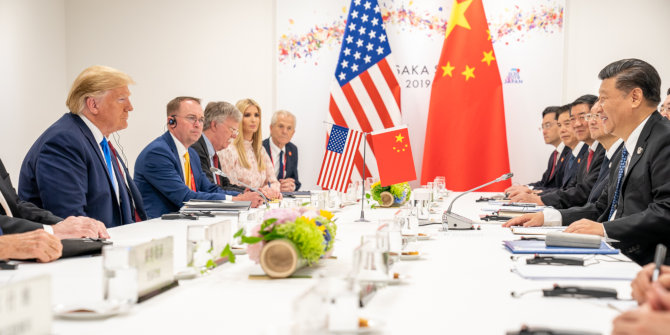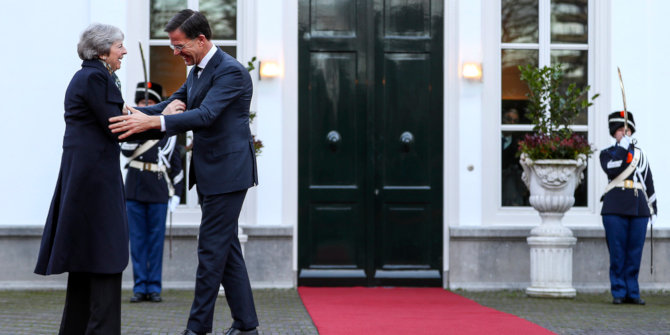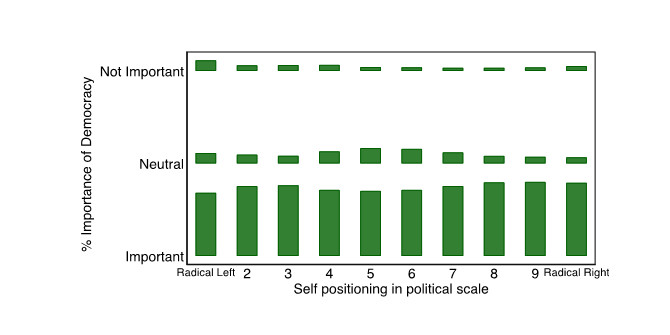 Former Portuguese Prime Minister, António Guterres, is expected to be appointed as the next UN Secretary-General later today, replacing Ban Ki-Moon, who will step down at the end of the year. As Katie Verlin Laatikainen outlines, the selection process adopted to select Ban Ki-Moon’s successor was intended to be more transparent than in previous years, but the appointment of Guterres will nevertheless leave some observers disappointed as there had been hopes that either a female or Eastern European candidate would take on the position for the first time.
Former Portuguese Prime Minister, António Guterres, is expected to be appointed as the next UN Secretary-General later today, replacing Ban Ki-Moon, who will step down at the end of the year. As Katie Verlin Laatikainen outlines, the selection process adopted to select Ban Ki-Moon’s successor was intended to be more transparent than in previous years, but the appointment of Guterres will nevertheless leave some observers disappointed as there had been hopes that either a female or Eastern European candidate would take on the position for the first time.

The UN General Assembly is scheduled to meet in a plenary session today to appoint António Guterres as the ninth UN Secretary-General. This appointment caps an unprecedented selection process to replace Ban Ki-Moon whose term finishes at the end of the year. Guterres, a former UN High Commissioner for Refugees and former Portuguese Prime Minister, topped the first five straw polls held by the Security Council since the end of July.
The ballots used in those straw polls did not differentiate between permanent and non-permanent members, and they indicated only whether the Council members ‘encouraged’, ‘discouraged’, or had ‘no opinion’ on the particular candidacies. Guterres was unanimously selected by the Security Council after it became clear in its sixth poll (using colour-coded ballots) on October 5 that none of the five permanent members opposed his candidacy (4 encourage and 1 no opinion) and he received a total of 13 encourage votes by the 15 member UN Security Council.
According to the UN Charter, the Secretary-General is appointed by the General Assembly upon the recommendation of the Security Council. The most important criterion for selecting the Secretary-General is competence/merit, but often individuals have been selected because they were the least objectionable to the five permanent members of the Security Council, China, France, Russia, the United Kingdom and the United States. Historically, this has meant that the members of the Security Council negotiated in secret, then presented a consensus candidate to the General Assembly that has always approved the Council-recommended candidate.
That Guterres was selected unanimously in rather expeditious fashion is somewhat surprising given the unprecedented nature of the process this time around. There had been an influential campaign run by NGOs and UN watchers to make the selection process more open and transparent and less Security-Council centred. Their attempts to influence the process were enthusiastically supported by the recent president of the UN General Assembly, Mogen Lykketoft, as well as the British who are of course among the permanent members.
A more transparent process
This transparency campaign resulted in a number of innovations in the appointment process: all of the candidates prepared a vision statement that is publicly available, met with the entirety of the UN membership in ‘informal dialogues’, and engaged with civil society through a relatively stilted but none-the-less photogenic effort to allow ordinary people to ask questions of the person who – uniquely in politics – ‘stands’ not for one constituency or people but for the entirety of international society. In July, there was even an American style ‘town-hall’ meeting which allowed diplomats and civil society representatives to publicly interact with the candidates hoping to lead the organisation.
A recurrent theme in this more open process has been broad support for the idea of gender equality. Ban Ki Moon himself has said that it is ‘high time’ for a woman to serve as Secretary-General, a position that requires independence, creativity, nearly herculean negotiating skills, and a limitless energy to handle the egos of those accustomed to ambassadorial privilege. All told, six of the thirteen candidates who took part in the process were women. Only one, UNESCO chief Irina Bokova of Bulgaria, polled consistently among the top five candidates in the first five straw polls, but she only polled 9 encourage votes in the first poll (tying for third), and never improved her standing.
Another consideration was nationality. The UN principle of geographic distribution suggested that the next Secretary-General should come from Eastern Europe, as the other regional groups have all had at least one individual from their regions serve in this most exclusive of positions (three of the previous eight Secretary-Generals have been from Western Europe). Russia in particular was pressing for an Eastern European. The Slovakian government solicited Russian support which may explain the meteoric rise of former Slovakian Foreign Minister Miroslav Lajčák, who was ninth in the second straw poll conducted on 5 August, but came in second in the third straw poll.
The geographic criterion also produced some eleventh hour drama, as Bokova’s mediocre polling prompted the Bulgarian government to ‘withdraw’ its support in favour of her compatriot Kristalina Georgieva, Vice-President of the European Commission, who announced her candidacy in the waning days of September. This late candidacy was strongly supported by Germany but irritated France. Bokova stayed in the race and remained the most viable female candidate, ultimately polling fourth; Georgieva participated only in the final poll where it was clear that she was unacceptable to two of the veto-wielding Security Council members and received more discouraging than encouraging votes.
In the end, however, while the effort to pry open the secretive process has partially succeeded, the ‘popular’ criteria for the next Secretary-General (regional rotation, gender considerations) gave way to the candidate that was most acceptable to the members of the Security Council. The momentum behind Guterres was clear throughout the process; he never received fewer than 11 encourage votes in any poll, and he was the top candidate in every vote.
Even the British, who were supportive of greater transparency, encouraged the least popular candidates (those receiving fewer than nine encourage votes) to drop out of the race in mid-September, but none did. Guterres is deeply respected and popular among both the diplomatic community and UN observers. His performance in the informal dialogues was very strong. Yet he lacks the two properties that traditional practice and public opinion promoted in this race: he is neither from Eastern Europe nor a woman.
Business as usual?
The selection process for the UN Secretary-General has become more transparent and has allowed a public glimpse at what was once a closed conclave. Traditionally even the results of Security Council straw polls have remained confidential, but part of the transparency campaign has been to keep information flowing. The public demand to know has been met with nearly immediate leaks of poll results, much to the irritation of the Russian delegation which argued that straw polls were the private concern of the Security Council. Though the digital age inculcates a desire for immediate information and participation, the choice of ‘one for seven billion’ (the name of the transparency campaign) has ultimately remained centred in the politics of the Security Council.
However, while the new process has not fundamentally changed who selects the Secretary-General, it may be that the campaign has elevated the criteria of competence and merit in the selection process and created new demands for accountability. In that regard, the overall process is an improvement even if the demands of civil society for a woman went unfulfilled.
Guterres’ strong polling throughout the selection process, even among the permanent members, provides a fairly strong mandate to act as more ‘general’ than ‘secretary’ in his dealings with Security Council members should he choose to do so. Such empowerment vis-à-vis the permanent members would be enhanced if Secretary-Generals were to serve a single, non-renewable seven-year term in order to avoid the need to solicit support for their reappointment, as many UN observers have proposed. Further, Guterres has vowed to appoint women to half of the senior posts (perhaps even Bokova), though that is unlikely to assuage those who campaigned for the first female Secretary-General.
Despite the greater demands for accountability, the selection of the Secretary-General continues to be dominated by the Security Council. Unless of course the General Assembly feels empowered today to reject the recommendation of the Security Council or to change the terms of the appointment based upon the demands of civil society that have emerged in this process. That would be clear evidence of transformed politics at the UN.
Please read our comments policy before commenting.
Note: This article gives the views of the author, and not the position of EUROPP – European Politics and Policy, nor of the London School of Economics.
Shortened URL for this post: http://bit.ly/2eucBeF
_________________________________
 Katie Verlin Laatikainen
Katie Verlin Laatikainen
Katie Verlin Laatikainen is Professor at Adelphi University in the United States and Visiting Professor at Tampere University in Finland.





